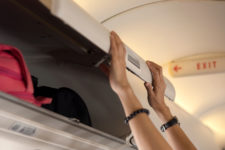Is It a Crime to Import Cigarettes into Australia?

The tax on tobacco in Australia is astronomical, pushing the average price of a cigarette packet beyond forty dollars in recent months.
The tax has been justified on public health grounds, and has been partially responsible for significantly reducing the consumption of tobacco products in Australia.
The tax has been accompanied by a range of restrictions on the importation of tobacco products, with the number of cigarettes that a person can bring into the country without a permit being reduced from 200 just a few years ago, to one unopened packet of up to 25 cigarettes and one open packet of up to 25 cigarettes.
Restrictions have also been placed over the years on the use of tobacco, with prohibitions on a range of venues and public places.
The exorbitant price of tobacco has contributed to a thriving black market, with many arranging for the importation of products by mail and others packing it into their luggage.
And while many feel there’s little wrong with bringing a few extra packs into the country, the law says something completely different.
The law on importing tobacco products
Since 1 July 2019, tobacco products including cigarettes, loose leaf tobacco, shisha/molasses tobacco and ‘heat not burn’ tobacco have been classified as prohibited imports, which means it is a criminal offence to import them in the mail. A permit is required to import them otherwise.
A permit is not required to import cigars or up to 1.5 kilograms of chewing tobacco and snuffs intended for oral use, provided duties and taxes are paid.
Travellers into Australia do not require a permit to import tobacco products in personal effects, provided they are 18 years or older, declare the product/s upon arrival and pay duties and taxes. Permission is, however, required from the Australian Competition and Consumer Commissioner to bring in more than 1.5 kilograms of chewing tobacco or snuff.
Travellers who contravene these rules are subject to having their visas cancelled, being issued with infringement notices (fines) or being criminally prosecuted.
Criminal offences
Section 233BABAD of the Customs Act 1901 (Cth) sets out four separate criminal offences which relate to tobacco products.
Subsection (1) prescribes a maximum penalty of 10 years in prison for ‘importing tobacco goods’ with ‘the intention of defrauding the revenue’.
The offence applies, for example, where a person brings tobacco products into the country in breach of the rules or arranges for their importation in the mail.
Subsection (2) sets the same maximum penalty for possessing or conveying tobacco products in the knowledge that they were imported with the intention to defraud the revenue.
The offence applies to those who receive or transport tobacco products for which they know duties and taxes haven’t been paid.
In addition to prison, those who are guilty under subsection (1) or (2) are subject to fines equivalent to up to five times the amount of the applicable duty or, if the court is unable to determine that duty, a maximum of 1,000 penalty units (currently $210,000).
Subsection (2A) prescribes a maximum penalty of five years behind bars for importing tobacco products in circumstances where the person is reckless as to whether there would be a defrauding of the revenue.
A person is ‘reckless’ for the purposes of the subsection if they were aware it was likely that there would be a defrauding but went ahead with their actions regardless.
And subsection (2B) sets the same 5 year maximum penalty for possessing or conveying tobacco products where the person is reckless as to whether they were imported with the intention to defraud the revenue.
A person is ‘reckless’ if they were aware it was likely that the products were imported with the intention to defraud but went ahead with their actions regardless.
In addition to prison, those who are guilty under subsection (2A) or (2B) are subject to fines equivalent to up to three times the amount of the applicable duty or, if the court is unable to determine that duty, a maximum of 500 penalty units (currently $105,000).
For the purposes of the Act, ‘tobacco products’ are broadly defined as including:
- Unmanufactured tobacco and tobacco refuse,
- Cigars, cheroots, cigarillos and cigarettes of tobacco and tobacco substitutes, and
- Other manufactured tobacco and substitutes, extracts and essences, including water pipe tobacco.
See section 4 of the Customs Act which refers to Schedule 3 of the Customs Traffic Act 1995.
Going to Court for an Offence Involving Tobacco Products?
If you have been charged with an offence involving tobacco, call Sydney Criminal Lawyers anytime on (02) 9261 8881 to arrange a free first conference with an experienced defence lawyer who will advise you of your options and the best way forward, and fight to ensure you receive the optimal outcome.






